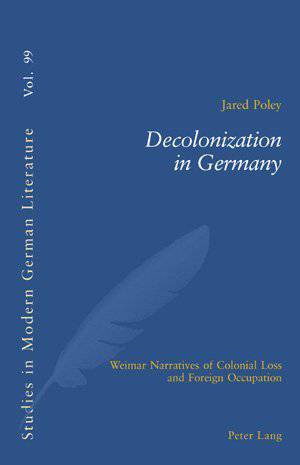
- Afhalen na 1 uur in een winkel met voorraad
- Gratis thuislevering in België vanaf € 30
- Ruim aanbod met 7 miljoen producten
- Afhalen na 1 uur in een winkel met voorraad
- Gratis thuislevering in België vanaf € 30
- Ruim aanbod met 7 miljoen producten
Zoeken
€ 50,45
+ 100 punten
Omschrijving
When Germany lost its colonial empire after the Great War, many Germans were unsure how to understand this transition. They were the first Europeans to experience complete colonial loss, an event which came as Germany also wrestled with wartime collapse and foreign occupation.
In this book the author considers how Germans experienced this change from imperial power to postcolonial nation. This work examines what the loss of the colonies meant to Germans, and it analyzes how colonialist categories took on new meanings in Germany's «post-colonial» period. Poley explores a varied collection of materials that ranges from the stories of popular writer Hanns Heinz Ewers to the novels, essays, speeches, pamphlets, posters, and archival materials of nationalist groups in the occupied Rhineland to show how decolonization affected Germans. When the relationships between metropole and colony were suddenly severed, Germans were required to reassess many things: nation and empire, race and power, sexuality and gender, economics and culture.
In this book the author considers how Germans experienced this change from imperial power to postcolonial nation. This work examines what the loss of the colonies meant to Germans, and it analyzes how colonialist categories took on new meanings in Germany's «post-colonial» period. Poley explores a varied collection of materials that ranges from the stories of popular writer Hanns Heinz Ewers to the novels, essays, speeches, pamphlets, posters, and archival materials of nationalist groups in the occupied Rhineland to show how decolonization affected Germans. When the relationships between metropole and colony were suddenly severed, Germans were required to reassess many things: nation and empire, race and power, sexuality and gender, economics and culture.
Specificaties
Betrokkenen
- Auteur(s):
- Uitgeverij:
Inhoud
- Aantal bladzijden:
- 290
- Taal:
- Engels
- Reeks:
- Reeksnummer:
- nr. 99
Eigenschappen
- Productcode (EAN):
- 9783039113309
- Verschijningsdatum:
- 23/08/2007
- Uitvoering:
- Paperback
- Formaat:
- Trade paperback (VS)
- Afmetingen:
- 150 mm x 220 mm
- Gewicht:
- 419 g

Alleen bij Standaard Boekhandel
+ 100 punten op je klantenkaart van Standaard Boekhandel
Beoordelingen
We publiceren alleen reviews die voldoen aan de voorwaarden voor reviews. Bekijk onze voorwaarden voor reviews.











